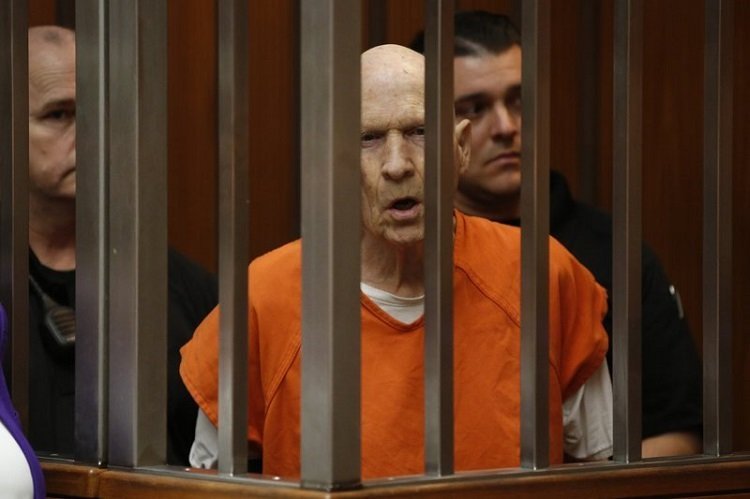Forty years after a sadistic suburban rapist terrorized California in what investigators later realized were a series of linked assaults and slayings, a 74-year-old former police officer is expected to plead guilty Monday to being the elusive Golden State Killer.
The deal will spare Joseph James DeAngelo Jr. any chance of the death penalty for 13 murders and 13 kidnapping-related charges spanning six counties. In partial return, survivors of the assaults that spanned the 1970s and 1980s expect him to admit to up to 62 rapes that he could not be criminally charged with because too much time has passed.
Yet nothing is certain until he actually speaks in a Sacramento State University ballroom pressed into use as a courtroom to provide for social distancing during the coronavirus pandemic.
“I’ve been on pins and needles because I just don’t like that our lives are tied to him, again,” said Jennifer Carole, the daughter of Lyman Smith, a lawyer who was slain in 1980 at age 43 in Ventura County. His wife, 33-year-old Charlene Smith, was also raped and killed.
Investigators early on connected certain crimes to an armed and masked rapist who would break into sleeping couples’ suburban homes at night, binding the man and piling dishes on his back. He would threaten to kill both victims if he heard the plates fall while he raped the woman.
Gay and Bob Hardwick were among the survivors.
They are now looking forward to DeAngelo admitting to that 1978 assault. The death penalty was never realistic anyway, she said, given DeAngelo’s age and Gov. Gavin Newsom’s moratorium on executions.
“He certainly does deserve to die, in my view, so I am seeing that he is trading the death penalty for death in prison,” she said. “It will be good to put the thing to rest. I think he will never serve the sentence that we have served — we’ve served the sentence for 42 years.”
A guilty plea and life sentence avoids a trial or even the planned weeks-long preliminary hearing. The victims expect to confront him at his sentencing in August, where it’s expected to take several days to tell DeAngelo and Sacramento County Superior Court Judge Michael Bowman what they have suffered.
Ron Harrington’s younger brother, Keith, was married to Patti Harrington for just three months when they were bludgeoned to death in their Orange County home in 1980 by a killer then known as the Original Night Stalker.
All four brothers were successful, but “Keith, the youngest of all of us, was the smartest,” he said. “It’s just such a loss. And every time this comes up I think of all the lives he would have saved as an emergency room doctor.”
Their father found the couple two days later.
“It was so gruesome,” Harrington said. ”My dad was never the same.”
The killer racked up a series of monikers for his crimes over the decades.
Visalia Ransacker.
East Area Rapist.
Original Night Stalker.
Diamond Knot Killer.
But it wasn’t until years later that investigators connected a series of assaults in central and Northern California to later slayings in Southern California and settled on the umbrella Golden State Killer nickname for the mysterious assailant whose crimes spanned 11 counties from 1974 through mid-1986.
The mystery sparked worldwide interest, a best-selling book and a six-part HBO documentary, “I’ll Be Gone in the Dark,” that premiered Sunday.
It was only the pioneering use of new DNA techniques that two years ago led investigators to DeAngelo, who was fired from the Auburn Police Department northeast of Sacramento in 1979 after he was caught shoplifting dog repellent and a hammer. He previously had worked as a police officer in the Central Valley town of Exeter from 1973 to 1976, near where the Visalia Ransacker struck more than 100 homes south of Fresno.
Investigators painstakingly built a family tree by linking decades-old crime scene DNA to a distant relative through a popular online DNA database. They eventually narrowed in on DeAngelo with a process that has since been used in other cases nationwide, but said they confirmed the link only after surreptitiously collecting his DNA from his car door and a discarded tissue.
His defense attorneys have publicly lobbied since then for a deal that would spare him the death penalty, though they did not respond to repeated requests for comment before Monday’s hearing.
Prosecutors who had sought the death penalty cited the massively complicated case and the advancing age of many of the victims and witnesses in agreeing to consider the plea bargain.
“Death doesn’t solve anything. But him having to sit though a trial or preliminary hearing, that would have helped,” said Carole, who said neither she nor her slain father believed in capital punishment.
She was so committed to seeing the case through that she temporarily moved from Santa Cruz to her adult daughter’s Sacramento home, where she has slept on an air mattress in a spare bedroom. She has told the story of her father’s death and her own recent experiences through podcasts called The Lawyer’s Daughter.
But she said it “absolutely” makes sense for prosecutors to agree to a life sentence without parole, both to spare older victims and witnesses who are most vulnerable to the coronavirus from having to appear in court, and to save taxpayers the $20 million projected cost of a trial.
Harrington supports the death penalty, but also agreed with prosecutors’ decision “just to give some degree of closure.”
“This will be a relief for all of us, to move on with our lives,” said Hardwick. “We’ve dealt with the effects of the attack for 42 years.”

